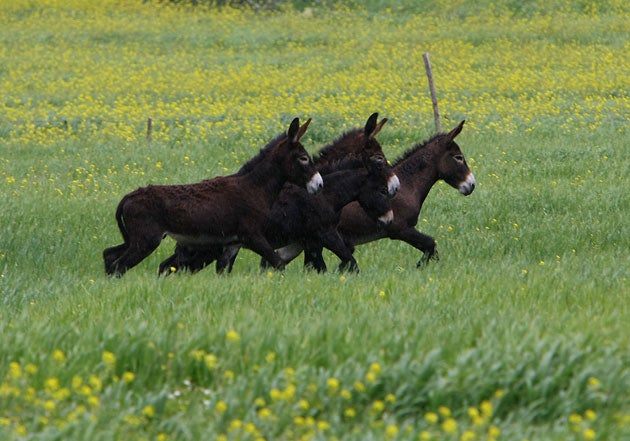Eeyore plague: wild donkeys overrun Cyprus villages
Left to roam after the Turkish invasion in 1974, the beasts have thrived

The donkeys of Cyprus are a particularly stubborn lot. Decades after machines replaced them as the backbone of the farming economy, the animals just refuse to bow out. Fiercely territorial wild herds have overrun a remote part of the island, trampling crops, scaring drivers and giving authorities a headache over what to do.
The invasion has pitted village communities against environmental activists. The donkeys also serve as an unlikely reminder of the violent recent history of Cyprus – split for the past 35 years into a Greek Cypriot south and a Turkish Cypriot north. Mehmet Demirci, mayor of Dipkarpaz, or Rizokarpaso in Greek, in the breakaway Turkish north, says donkeys outnumber villagers by two to one and should be forcibly sterilised, or even expelled to Turkey.
"The donkeys are a real problem. The authorities just don't care about us," Mr Demirci said. He added that the last straw was the death last summer of a local youth, who crashed his car trying to avoid a wandering herd.
Although estimates of the precise number of feral donkeys vary, Mr Demirci says there are now about 1,000, all officially protected by Turkish Cypriot authorities. The beasts are a peculiar remnant of war, abandoned in 1974 by Greek Cypriot farmers fleeing an invading Turkish army. The island has since been split along ethnic lines, despite repeated diplomatic efforts for its reunification.
Despite a lack of human care, the animals have multiplied and thrived in the sparsely populated Karpas peninsula, a largely unspoiled sliver of land sticking out of the Mediterranean island's north-eastern edge. Over the decades, they have been broadly adopted as a cuddly symbol of the island's agrarian past. "Donkeys have offered so much," says Maria Nicolaou, manager of a donkey sanctuary near the coastal resort of Limassol, in the island's internationally recognised Greek-Cypriot south. "They are beautiful animals and very smart."
But most Karpas residents just see the animals as a major pain. Mr Demirci says 1,000 donkeys are far too many for a 116 square mile (300 square kilometre) area. Locals say they gobble up wheat and barley crops, ravage fruit and vegetable gardens, trample down vines and wantonly amble across the peninsula's narrow roads.
Mr Demirci says at least three villagers have been convicted of shooting donkeys dead and have each been fined €1,000 (£876). They were fortunate to avoid jail – intentionally killing the protected animals is punishable by up to seven years in prison. Hoping to capitalise on the frustration, one Turkish businessman offered to buy several of the donkeys at €1,000 per head, and put them to tourism-related work in Antalya, Turkey. Mr Demirci said the idea "made good sense", but was turned down by Turkish Cypriot authorities. Word of the rumoured sale drew quick condemnation from environmentalists on either side of the heavily militarised divide. Kenyan Atakol, head of the Turkish Cypriot environmentalist group Cekova, says sterilisation is a solution officials could consider.
Local conservationist Lois Cemal says a "sustainable" donkey population could be rounded up and placed in two or three smaller sanctuaries that could be converted into moneymaking eco-tourism enterprises, such as petting zoos or farms. "Ecotourism is a solution for sustainable development," she says. "You won't need to build five-star hotels."
Join our commenting forum
Join thought-provoking conversations, follow other Independent readers and see their replies
Comments
Bookmark popover
Removed from bookmarks